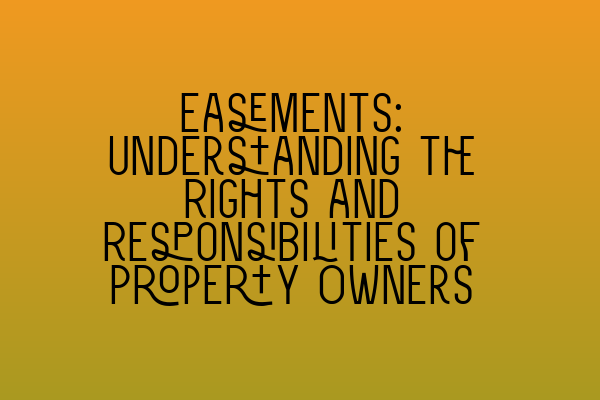Easements: Understanding the Rights and Responsibilities of Property Owners
Welcome to the blog of SQE Property Law & Land Law, where we strive to provide valuable insights into various aspects of property law. In today’s post, we will be discussing easements – a fundamental concept that property owners should be familiar with. Understanding easements is crucial as they affect property rights and can have significant implications for both residential and commercial properties. So, let’s dive right in!
What are Easements?
An easement is a legal right that grants someone who doesn’t own a property, known as the “beneficiary,” the right to use a specific part of another person’s property, known as the “servient tenement.” This right is attached to the property itself and not to the individual. Easements are usually created for the benefit of neighboring properties or public utilities.
Common Types of Easements
There are several types of easements that property owners should be aware of, including:
- Right of way: This is the most common type of easement and allows someone to pass through another person’s property.
- Utility easement: This easement grants utility companies the right to access and maintain utility lines, such as electricity, water, or gas lines, within the property.
- Air and light easement: This easement ensures that neighboring properties have a right to receive sunlight or maintain unobstructed views.
- Conservation easement: This type of easement is created to protect and preserve natural resources or historic properties.
- Private easement: This easement is established by agreement between property owners and can include various usage rights, such as the right to use a driveway or garden.
Creating and Terminating Easements
Easements can be created in a variety of ways, such as by express agreement, implication, necessity, or prescription. It’s important to consult a qualified property lawyer to ensure the proper creation of an easement. On the other hand, easements can also be terminated through expiration, release, abandonment, or merger.
Rights and Responsibilities
With easements come certain rights and responsibilities for both the property owner and the beneficiary. Let’s explore these below:
Rights of the Property Owner
- Exclusive use: The property owner has the right to use and enjoy their property, excluding the portions subject to the easement.
- Maintenance: The property owner is responsible for maintaining the servient tenement unless otherwise specified in the easement agreement.
- Ability to limit use: The property owner can impose reasonable restrictions on the use of the easement, as long as they do not unduly interfere with the beneficiary’s rights.
Responsibilities of the Property Owner
- Non-interference: The property owner must not obstruct or interfere with the beneficiary’s use of the easement.
- Repair and maintenance: If the easement agreement specifies repair and maintenance responsibilities, the property owner must fulfill these obligations.
Rights of the Beneficiary
- Reasonable use: The beneficiary has the right to use the easement for the specified purpose outlined in the agreement.
- Right of access: The beneficiary has the right to access the property to exercise their easement rights.
- Transferability: In most cases, easements can be transferred to subsequent property owners, ensuring the continuity of the rights.
Responsibilities of the Beneficiary
- Maintenance: Unless otherwise agreed upon, the beneficiary is generally responsible for maintaining any improvements made to the easement area.
- Compensation: In some cases, the beneficiary may be required to provide compensation to the property owner for the use of the easement, as outlined in the agreement.
Conclusion
Easements play a crucial role in defining the rights and responsibilities of property owners. Understanding easements is essential to protect your property interests and ensure compliance with legal requirements. If you have any questions or need assistance with easements or any other property law matters, please don’t hesitate to contact us. We are here to help!
